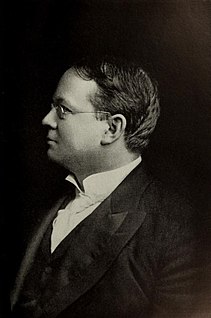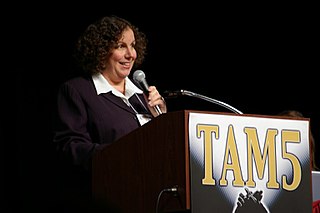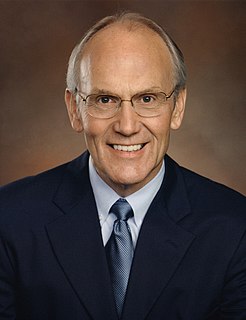A Quote by William Rainey Harper
The majority has no right to impose its religion on the rest. That's a tradition as sacred as the Constitution itself to this country.
Related Quotes
I would not, under any circumstances, try to impose my personal faith and belief on the rest of the country. I don't think that's right. I don't think that's appropriate. But freedom of religion doesn't mean freedom from religion. And I think that anything we can do to promote the idea that people should express their faith is a good thing.
Was the majority right when they stood by while Jesus was crucified? Was the majority right when they refused to believe that the earth moved around the sun and let Galileo be driven to his knees like a dog? It takes fifty years for the majority to be right. The majority is never right until it does right.
In the First Amendment to the Constitution, the Founders made it clear that this was not to be a sky-god nation with a national religion like that of England, from whom we had just separated. It is curious how little understood this amendment is-yes, everyone has a right to worship any god he chooses but he does not have the right to impose his beliefs on others who do not happen to share in his superstitions and taboos.
We may be thankful that frightened civil authorities ... have not managed to eradicate from the country the tradition of the possession and use of firearms, that profound and almost instinctive tradition of Americans. Luckily for us, our tradition of bearing arms has not gone from the country, the tradition is so deep and so dear to us that it is one of the most treasured parts of the Bill of Rights - the right of all Americans to bear arms, with the implication that they will know how to use them.
The first right of every human being is the right of self-defense. Without that right, all other rights are meaningless. The right of self-defense is not something the government bestows upon its citizens. It is an inalienable right, older than the Constitution itself. It existed prior to government and prior to the social contract of our Constitution.
The most active people in the country know different things, and because each one tends to hear mostly and deal mostly with people with whom they agree, they are reinforced not simply in the conviction that they are right, which is totally appropriate, but that they are the majority. So you have both sides, the Left and the Right, thinking that the majority of the country is really with them.
In the case of my country, Guatemala, 65% of the inhabitants are indigenous. The constitution speaks of protection for the indigenous. Who authorized a minority to protect an immense majority? It is not only political, cultural and economic marginalization, it is an attempt against the dignity of the majority of the population.
Is the appointment of Chaplains to the two Houses of Congress consistent with the Constitution, and with the pure principle of religious freedom? In strictness the answer on both points must be in the negative. The Constitution of the U. S. forbids everything like an establishment of a national religion. The law appointing Chaplains establishes a religious worship for the national representatives, to be performed by Ministers of religion, elected by a majority of them, and these are to be paid out of the national taxes. Does this not involve the principle of a national establishment ... ?

































